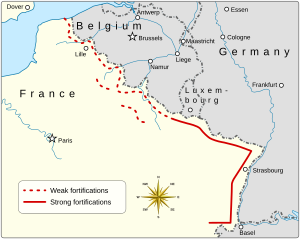Historiography of the Battle of France facts for kids
The historiography of the Battle of France is about how historians and others have explained why Germany won against France and Britain in the Battle of France. Many people in 1940 were shocked by France's quick defeat. It was very unexpected. Belgium and the Netherlands also fell quickly to the German army. British forces were soon pushed back to the British Isles.

France's defeat truly shocked the world. It wasn't just a military loss. It also led to a big political change. The French government, called the Third Republic, was replaced. A new government, known as Vichy France, took over. This new government was more strict and worked with Germany. This was very confusing because France was seen as a powerful country. The historian Marc Bloch called it a "strange defeat".
Contents
What People Thought in 1940
While French armies were losing, the government turned to older military leaders. These leaders had fought in the First World War. Many people felt there was a secret plan causing the defeat. But these new leaders blamed a lack of patriotism. They said schools had taught children to be too liberal. This idea has often been repeated by some people since 1940.
General Maxime Weygand took charge in May 1940. He said, "We are paying for twenty years of mistakes." He believed teachers were to blame. He felt they had not taught children enough patriotism. He also claimed that officers who left their units were taught by "teachers who were Socialists and not patriots."
The new leader of Vichy France, Marshal Philippe Pétain, also gave his reason. He said, "Our defeat is punishment for our moral failures." He believed that people caring too much about pleasure had ruined the spirit of sacrifice.
Early Books About the Battle
Many books were written soon after the battle. They tried to explain what happened. Some of these books were written by people who were there.
From Lemberg to Bordeaux (1941)
From Lemberg to Bordeaux: A German War Correspondent’s Account of Battle in Poland, the Low Countries and France, 1939–40 was written by Leo Leixner. He was a journalist and war reporter. The book tells about the battles that led to the fall of Poland and France.
Leixner joined the German army in August 1939. He worked as a war reporter. He was promoted to sergeant. In 1941, he published his memories of the war. The book was first published by Franz Eher Nachfolger. This was the main publishing house for the Nazi Party.
Tanks Break Through! (1940)
Tanks Break Through! (Panzerjäger Brechen Durch!) was written by Alfred-Ingemar Berndt. He was a journalist. He also worked closely with Joseph Goebbels, who was in charge of German propaganda. This book also describes the battles that led to France's defeat.
Berndt joined the German army in 1940. He was a sergeant in an anti-tank division. He then published his memories. The book was first published in 1940 by Franz Eher Nachfolger. This was the main publishing house for the Nazi Party.
Strange Defeat (1940)
L'Etrange Defaite temoignage ecrit en 1940 (Strange Defeat: A Statement of Evidence Written in 1940) was a book by the historian Marc Bloch. He wrote it in 1940. But it was published after he died in 1946. Bloch brought up many of the questions historians still discuss today. He blamed the French leaders.
What drove our armies to disaster was the cumulative effect of a great number of different mistakes. One glaring characteristic is, however, common to all of them. Our leaders...were incapable of thinking in terms of a new war.
—Bloch
Bloch believed many people were at fault. Historian Carole Fink wrote that Bloch blamed many groups. He blamed the ruling class, the military, and the politicians. He also blamed the press and the teachers. He felt they had all failed France and its children. Bloch believed Germany won because its leaders understood modern warfare better.
 | Toni Morrison |
 | Barack Obama |
 | Martin Luther King Jr. |
 | Ralph Bunche |

